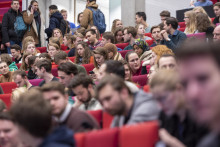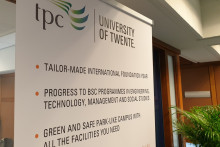Approximately 14,500 international students receive student financing in the Netherlands, according to the Dutch Education Executive Agency DUO. This is more than before, which may be partly attributable to the new basic student grant.
The radio programme ‘Nieuws en Co’ requested the figures from DUO, the provider of student financing, and asked NSC party leader Pieter Omtzigt to comment on this during Friday evening's show. Omtzigt expects to see a significant increase in the coming years.
In 2021, more than 9,000 international students received student financing, and in 2022 this rose to 12,000. The current calendar year is not yet over, but in 2023 the figure is expected to be around 14,500. This corresponds to one in eight or nine international students.
Part-time job
Young people from other EEA countries can study here under essentially the same conditions as Dutch students. They pay the lower statutory tuition fees, unlike students from outside Europe.
They are also entitled to student financing if they work part-time alongside their studies. Previously, they had to work at least 56 hours a month to qualify. After a series of court cases, this was reduced to 32 hours, or 24 hours if they have been working here for a while.
It was to be expected that international students would apply for student financing more often. After all, September saw the introduction of the basic student grant, which amounts to 275 euros per month for students living away from home (temporarily increased by 164 euros per month this academic year).
Curbing internationalisation
Omtzigt expects a steep increase in the number of international students receiving student financing, he said in ‘Nieuws en Co’. He wants to curb internationalisation by making higher education programmes largely Dutch-taught again. He also wants to negotiate the rules for granting student financing at European level.
Higher education institutions warn against drastic measures that would make it harder for foreign students to study in the Netherlands. They believe politicians are throwing the baby out with the bathwater.
Going too far
D66 is also cautioning against this. 'It is causing issues in some areas, but fundamentally internationalisation is a positive thing', says MP Jan Paternotte. 'Research shows that it brings in more money on balance than it costs, even if many students leave the country after graduating.'
He thinks a little more control over internationalisation is a good idea, but other parties want to go much further. Paternotte: 'I’m really concerned that we’re going too far. They did the same thing in Denmark and have now radically reversed their policy. The Danish business community was quick to sound the alarm.'
And the growing number of foreign students receiving Dutch student financing? 'That’s actually not as bad as it sounds, there aren’t that many of them', says Paternotte. 'Some parties are negative about everything related to internationalisation, such as teaching in English or student financing. But we also have labour market shortages in the Netherlands, and these students also have part-time jobs. So there are real benefits.'






